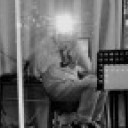Paul Sharp: Shark in a bus!

For twelve months now Paul Sharp has been touring Australia with his Shark In A Bus Travelling Museum to educate people about the changes occurring in the oceans around us. We all see the environmental and ecological changes taking place on land but, unless we make the effort, it is easy to miss the changes in the oceans. I spoke to Paul at Freshwater on Duke Day.
Swellnet: Tell me about Shark On A Bus
Paul Sharp: This is my heritage museum in a bus. My father and I put this together, it has its roots in Western Australia's first public aquarium which was on Cottesloe Beach in the late 60s. Then we used to travel around and catch live animals for aquariums. Eventually my father decided that he wanted to respond to the hysteria caused by Jaws and he thought he could do that by catching a Great White, putting it on display, getting people in and being able to talk to them. They used to think he was a nutter in the old days, talking about protecting Great White Sharks, but these days more and more people understand that it is a pretty important thing to do. We also work on plastic pollution in the environment. The proceeds of Shark On A Bus enable me to work for the Two Hands Project which is an organisation I started to tackle plastic pollution on the ocean. So it's all tied into educating people with a little bit of entertainment thrown in. It is a sideshow. The shark is 5 metres long, he's stuffed and his name is Frankie. My father caught him in a 3.5m dinghy when I was about 4 years old. There are hundreds of other objects in there as well including harpoons, fossils, jaws and shells.
So where have you been?
This is our third time around the country. It had been in storage for 10 years but I resurrected it in the last 12 months. In that time I have done the west coast up to Exmouth. Then drove across the Nullarbor, stopping off to exhibit in Adelaide. More recently I have been in Coffs, but I am now going to use Sydney as a base for the next few years to do a rolling tour of the east coast.
Are you qualified in marine science?
Not at all, it's pure life experience. I work with scientists as a field assistant on plastics pollution, sharks, sea grass and all kinds of stuff, but I'm not formally trained, I'm a high school drop out.
What changes have you noticed in the ocean over the years?
That is honestly why I do this. In my lifetime I have seen my favourite fishing spots change, I've seen species that I used to commonly see disappear from areas. The coastal Wobbegongs really got hammered there for a while, particularly in WA until they shut down the fishery. The Snapper! We used to catch massive amounts of huge fish, now you just don't get them that big. The beach fishing has changed too, species that we used to catch off the beach now, in my home town of Perth, you need to go 30 miles out to get them. When the old timers talked about the things they used to catch, us young guys thought they were lying, but they were telling the truth. And the plastic in the environment is simply mind boggling. When I was a kid it used to be exciting to find a bottle on the beach because it might have a message in it or be worth 20c. Now these kids today will never see a clean beach in their lifetime and that's something that just blows my mind.
Shark In A Bus is available for corporate events, school visits and environmental activities. Paul can be contacted via:
www.sharkinabus.com
Facebook.com/sharkinabus
Mobile: 0419041352

